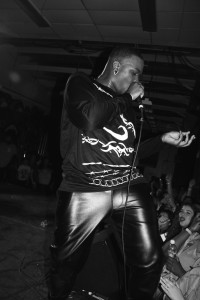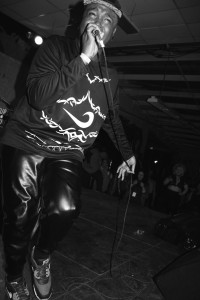Author | Allee Manning

Riding the L train from his new duplex in Bushwick—which he calls “the yuppie capital of the world”—to record in Red Bull’s Manhattan studios, 23-year-old rapper Cakes da Killa is not the same person he was two years ago. And that’s just fine with him.
After gaining popularity in the LGBTQ New York scene following the release of his mixtape “The Eulogy” in 2013 under the label MishkaNYC, the New Jersey native (formally named Rashard Bradshaw) became something of a mainstream media token as one of several up-and-coming openly gay hip hop artists. With hooks like, “Bitch, I wanna fuck your boifriend, bitch, I wanna fuck your man,” and beats perfect for the dance floor, it’s easy to see why.
Clumped with artists he respects but doesn’t relate to sonically within a contrived genre for the sake of “a hot trend piece,” Cakes reflects on the publicity as both a blessing and a curse.
“The first interview I ever did for mainstream media was with Pitchfork,” he says. “Not a lot of artists could say that.”
“With bills to pay and a taste of what this lifestyle could bring him, Cakes is as dead set against still being a “SoundCloud hustla” by the time he’s 25 as he is allowing others to pigeonhole him.”
Back from Eulogy’s international tour and having procured a Sound Select artist sponsorship with Red Bull, Cakes released “Hunger Pangs” in June, which he is touring this summer. In addition to a more polished level of production, Hunger Pangs emphasizes the ‘killa’ aspect of the rapper’s monicker: aggressive and tough as opposed to “a Pied Piper call for everyone that’s ever googled instructional twerk videos, or participated in a ‘skin to win’ contest,” as Mishka marketed his previous mixtape. He notes an intentionally increased focus on musical formats and stronger narratives, which is plain to see. So is the fact that the lyrics, press photos, and new music video for “Truth Tella” are significantly less playful, lewd, and feminine than what fans are used to.
With bills to pay and a taste of what this lifestyle could bring him, Cakes is as dead set against still being a “SoundCloud hustla” by the time he’s 25 as he is allowing others to pigeonhole him.

“When I first started rapping I was just talking shit mostly and I think that’s why people liked The Eulogy so much, ’cause it was just a bunch of shit talking,” he says with a laugh. “It’s like, people grow, you know, and I find that a lot of people when they see a project, they want to pin you down as one thing but it’s like, I was 21 [at the time of Eulogy]. Now I’m 23, I’m gonna be 24 soon. I’m not gonna be able to do the same thing and be the same person.”
In between touring Hunger Pangs across the country on his own and as an opening act for the iconic Peaches, Cakes takes a break from a busy schedule that includes “a lot of drinking, a lot of laughing, and a lot of writing music,” to open up about his newest project, shifting ambitions, and refusal to be put in a box.
AM: Tell me about what went into Hunger Pangs.
CdK: I think with this one I wanted it to be different than the Eulogy… When I was writing that project I was like, “OK, I want to make a project that sounds like the gayest I could be as a person. I want everyone to know my identity, I want everyone to know my disco and house references and I want it to be dance-y and I want [it] to take me to tour overseas.” …With this project, I didn’t want to harp anymore on the fact that I was gay because…I already established myself as that. So now I want to more focus on like a more lyrical, aggressive way of writing. …I just want to let bitches know that I’m hungry and I’m eatin’ people…having a really egotistical rapper guy moment.
AM: Given the name, what exactly are you hungry for?
CdK: I guess with that project I was hungry for respect.
AM: And do you feel like you’ve gotten it ?
CdK: I feel like in this field…you’re only as good as the last song someone heard of yours, so I feel like I’ll always be fighting for that respect, especially being a little flamer that I am (laughs). I feel like every song will be a fight.
AM: You’ve previously said that you “don’t want to be the first gay rapper on [the label] Young Money.” Have your career goals changed at all since then?
CdK: Yeah, I think so. I still don’t want to be the first gay rapper signed to Young Money, but I will be the first gay rapper signed to Nicki Minaj’s label (laughs). I think now I feel like the reason why my mind was in that type of lane was because I didn’t think that things like that would be a possibility. And I really didn’t think that me recording music would turn into anything in terms of like doing interviews, photo shoots, touring… there’s not a lot of people who could say that they’ve toured as much as I have…and I just feel like I’m thankful for it, but I want more now.
AM: So, this question is two parts. 1.) Do you feel like homosexuality in hip hop is still taboo? And 2.) How much longer until you’re sick of these kinds of questions if you’re not already?
CdK: Well, for the second part, I’m so sick of this question. Because to me, I don’t know. The hip hop panel hasn’t brought me to their dungeon to say whether or not I could rap anymore and I think people have this perception of getting acceptance from hip hop. Granted, I would love to be able to tap into some black media because as…an openly gay black artist, I feel like there are people who look like me who don’t read Pitchfork who don’t read…MTV.com. They go to these black media outlets to get information so I would love to be able to tap into that just so someone who looks like me and who identifies as me could see like, “Oh, there are people who look like me who are semi-successful being creative.” But in the same breath, my grind cannot just be based off that cause I have other fans who don’t look like me who also deserve the same attention.
AM: Why haven’t you been able to tap into these outlets?
CdK: I don’t know. I guess even in this day and age, being gay in the black community is still a taboo, or still something that gets swept underneath the rug sometimes. The main thing is the money. I don’t think a lot of people feel like artists like me can see a lot of revenue so we get overlooked sometimes.
AM: So, the “Truth Tella” video is effing beautiful…
CdK: Thank you.
AM: I’d love for you to tell me the idea behind it and how much of the artistic direction came from you personally.
CdK: Well for me, I definitely wanted to work with Minister Atkins because his aesthetic is exactly how I want all my videos to look. It’s very crisp, clean, and very sterile… it’s like a very timeless moment.
For me, “Truth Tella” is kind of like a sermon, so I definitely knew…I was gonna shoot it in a church or have a religious theme to it, that’s why I decided to work with him because that’s always been a strong theme in all his pieces. It was basically this narrative of this church boy that was gay but had this internal conflict of, “I still want to be able to go to church every Sunday but I still want to be able to suck dick.” The narrative came together after I watched the video… I saw a church boy playing dress up in his mom’s church clothes.
AM: Got it. What I saw in the video was this fantastic contradiction of two things totally at odds, especially during the hook with those flickering shots.
CdK: Yeah, I feel like my whole being is kind of like this walking contradiction of sweet and sour, feminine and masculine. I love all my videos because each video is a testament to that time, but I feel like if I had to put a video that would describe me like in a time capsule for people in the future it would be “Truth Tella.” I feel like people are so quick to want to put artists in a box, but I’m no different from you. You have your complexities and I have mine, too. I feel like that’s why I went with it. That song is…a hard hitting song but I literally look like a fucking chocolate porcelain doll in the video. I mean, you can’t take that away from me (laughs).
See “Truth Tella” video below…
